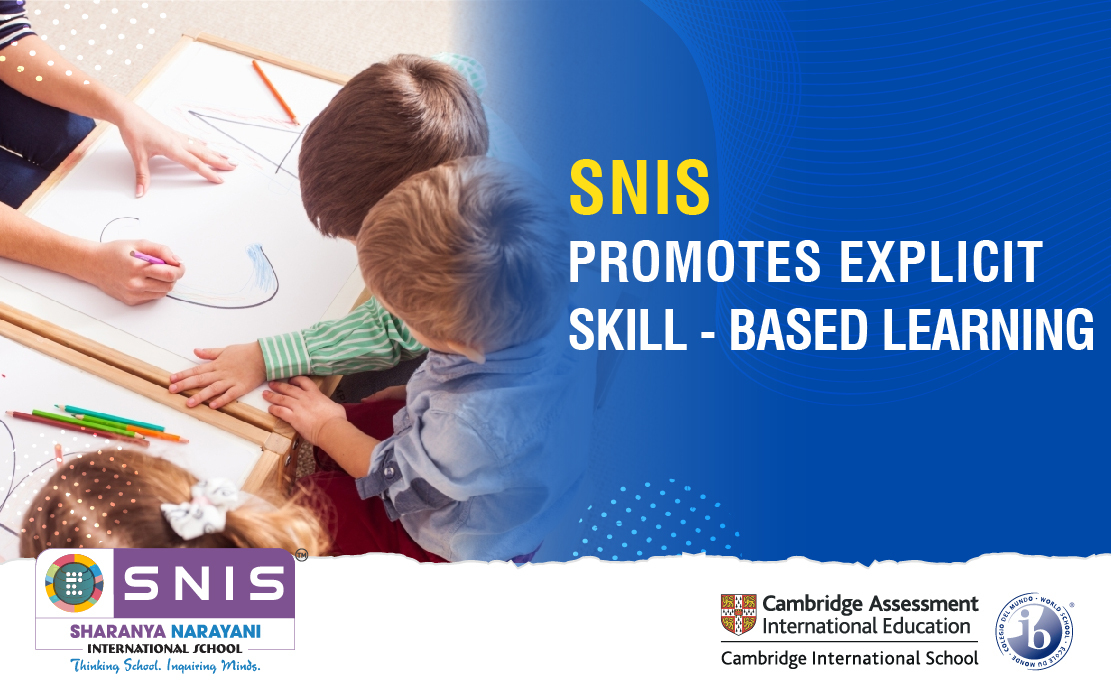
19 Jan SNIS Promotes Explicit Skill-Based Learning
“The future belongs to those who learn more skills and combine them in creative ways.”
— Robert Greene
IB introduced Approaches to Learning (ATL) to bridge the gap between what skills that are required in life beyond school and what skills we teach at Sharanya Narayani International School (SNIS) – a top international school in Bangalore. Being an IB school in Bangalore, we teach content through skills. Skills are explicitly taught by teachers and feedback is given to improve those skills. ATLs like organising and depicting information logically, designing, analysing and evaluating scientific methods, speaking in French/ Hindi, researching, and producing texts are some of the skills learnt by SNIS Students. Our students showcase their learning through Project-based assessments and exams. In this blog article, we will look at some examples of what grade 6 to 8 students at SNIS, which is one of the best international and residential schools in Bangalore, have learnt and showcased their learning through project-based assessments.
In Sciences, students in SNIS learnt how to organise and depict information logically. Students created a poster which included timelines for classification systems and learnt how to classify organisms like a Taxonomist. Students created an interesting booklet on the periodic table for younger kids and genetically modified organisms. Students wrote an article about the extraction process of aluminium from the past to the present. Students learnt how to create content in a variety of situations for different audiences and develop their research skills.
In Sciences, students learnt how to generate hypotheses and carry out scientific investigations like a scientist. For example, students designed an experiment on how the amount of sugar in an ice cream affects the freezing time of ice cream. Students designed an experiment on how the size of leaves affects transpiration. By analysing the collected data and understanding the experiments, students know how this will help drip irrigation and save water in their gardens. Students designed and investigated the angle of the ramp and acceleration using a simulation. Prior to this, students investigated acceleration using ramps on the school campus. The hands-on experiment leads ta o better understanding of concepts in real life. Students learn how to carry out experiments in a scientific method, not to forget the safety protocols followed.
In Language Acquisition, students read, listen, speak and write on regular basis. In French, Students learnt how to introduce students from different nationalities/regions. At this top boarding school in Bangalore, students took a survey on hobbies and created a presentation for speaking about their findings to their class. Students researched about advantages and disadvantages of technology and gave a 2 mins speech. Similarly, Hindi students learnt how to communicate information about themselves, school, and friendships. This makes learning very practical and transferable in real life.
In individuals and societies, students learnt how to plan for the research, acknowledge the sources, and evaluate the sources. Students learnt about civilizations, the positive and negative effects of Transnational Corporations, Natural disasters and World wars through research. Students learn how to carry out research and present their findings. Students build confidence to speak in Public and know how to choose reliable sources in this information age.
Students learnt mathematics in real-life contexts. Students used the knowledge of Statistics and studied the fat content in different foods. Students created a diet plan for people with obesity. Students visited supermarkets to collect data on different package sizes and the cost of groceries. Students further calculated, identified the best package and became better-informed consumers. Learning mathematics in real-life contexts makes their learning more meaningful.
In Language and literature, students produce texts in different forms like an Author. Students wrote a drama script based on a short story (Gift of the Magi) in the Indian context, pitched for a movie with settings, contexts, plots, conflict and resolution and students created a short film highlighting the effects of World War I. Students experience writing the scripts, story and directing one.
Being not only an IB School but also an IGCSE school in Bangalore, the students at SNIS learn varied skills from writing, speaking, directing, researching, thinking in real-life contexts, organising and depicting information logically, interpreting data, and evaluating data, methods and sources. I believe these skills will help students beyond school. Thanks to my teachers for all their efforts to make a positive difference for students.
-By Kalyani Ganapathi, MYP Coordinator



Sorry, the comment form is closed at this time.